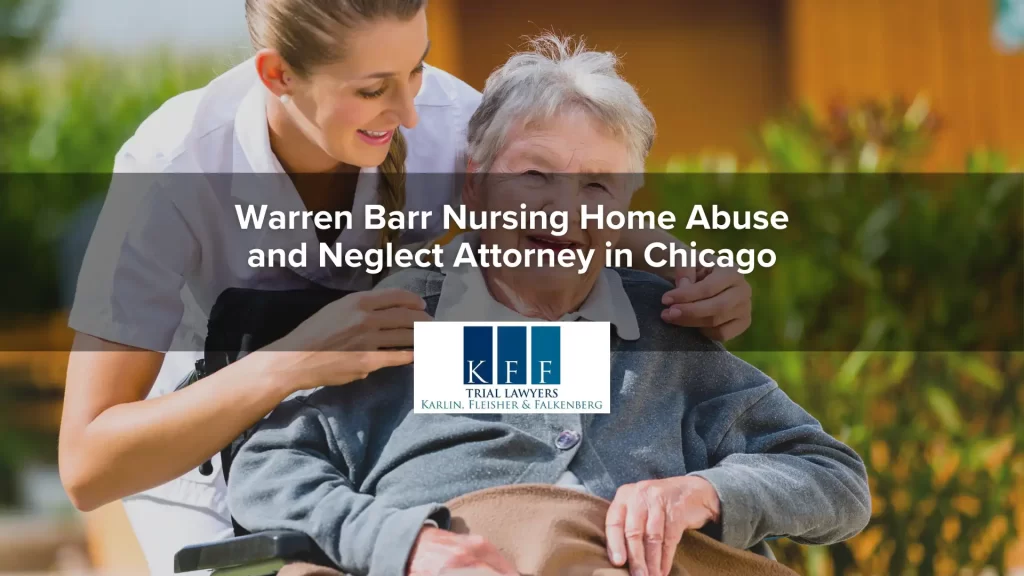
We can carefully plan, do our research, account for every detail, and still, sometimes things go terribly wrong. That may also be the case when it comes to choosing the right nursing home for an aging family member. You plan, read reviews, take tours, visit the staff, and do everything in your power to ensure your family member will be getting the best care available at Warren Barr nursing home. Sometimes, though, your loved one may still come to harm. Sadly, numbers from the World Health Organization show that around one in six adults over the age of 60 have experienced some type of abuse while living in a nursing home.
Perhaps you’re seeking an upscale, luxurious nursing home, such as Warren Barr nursing home, and it seems to check all the boxes for you and your family member. However, palatial settings can lull you into a false sense of security because even they aren’t immune to staff shortages or the poor hiring practices that may lead to abuse.
The nursing home attorneys with Karlin, Fleisher & Falkenberg, LLC know that abuse can happen anywhere to anyone. If you are being abused or you suspect a loved one is being abused at their nursing home facility, contact us today. Call 312-346-8620 to schedule a free consultation and share your concerns with us. We can thoroughly investigate your claims and help you get the compensation you deserve.
What Characterizes Nursing Home Abuse?
Defining nursing home abuse may seem simple. It is the act of inflicting intentional harm on an elderly resident by a person in a position of authority. Characterizing abuse, however, can be much more complex because abuse can take so many different forms. Hitting is abuse, but so is humiliating someone, berating them, restraining them for no medical purpose, bilking them into a scam investment.
All these things and more can also be considered forms of abuse. Nursing home abuse is an umbrella term for a caregiver inflicting intentional harm. These are the commons forms of abuse that fall under that umbrella:
Warning Signs of Nursing Home Abuse
Why should you be vigilant for the warning signs of abuse? In many cases, a loved one may not be able to communicate that abuse is taking place, either because of cognitive impairment or because they are being threatened into keeping silent. In cases of abuse, especially sexual abuse, there may be shame or stigma surrounding the event, and it is a burden the victim doesn’t want to share with friends or family members.
No matter the reason, you are the most important resource available when it comes to unmasking nursing home abuse. Spotting the warning signs could mean the difference between pain and suffering for the rest of a family member’s life or being able to comfortably enjoy their golden years. Elderly individuals who have suffered any form of abuse have a 300 percent higher risk of death compared to non-abused counterparts. Don’t let family become a statistic. Watch for these signs of abuse:
- Unexplained marks or signs of restraint
- Multiple broken bones or concussions
- Cuts, bruises, and burns
- Dislocations
- Blood in or on underwear or bed sheets
- Changes in eating or sleeping patterns
- Refusing to cooperate with certain caregivers
- Anxiety
- Depression
- Suicide attempt
- Withdrawing from family, friends, or favorite activities
- Missing possessions
- Change in a financial situation
- Inability to continue paying bills
- Unchanged or unwashed bed linens or clothing
- Poor hygiene
- Dehydration
- Malnutrition
If you notice any of these warning signs, your family member may be suffering from some form of nursing home abuse. If you are unsure where to turn, please give the legal team at Karlin, Fleisher & Falkenberg, LLC a call. We want to conduct a complete investigation into your claims before evidence of the abuse is covered up, lost, or destroyed.
Causes of Nursing Home Abuse
 In many areas, there are already shortages of critical medical staff and caregivers, including nurses and skilled medical professionals. One of the major causes of nursing home abuse cases is the chronic understaffing of these facilities. Chronic understaffing means that caregivers are required to carry more of a patient load than they should. This can lead to frustration, burnout, and low morale.
In many areas, there are already shortages of critical medical staff and caregivers, including nurses and skilled medical professionals. One of the major causes of nursing home abuse cases is the chronic understaffing of these facilities. Chronic understaffing means that caregivers are required to carry more of a patient load than they should. This can lead to frustration, burnout, and low morale.
Eventually, these resentful feelings may boil over, and caregivers can take out their frustrations on their elderly patients, either through abuse or neglect. Understaffing can occur due to a variety of circumstances. There may be shortages in skilled labor, or the nursing home itself may cut corners to save money by not hiring the staff they need.
Abuse cases can also occur when nursing homes fail to complete proper background screenings before hiring caregivers. Hiring without proper background checks can mean unqualified people may end up in caregiving roles. This can include people with a criminal background or those with improper or inadequate medical education or certification.
Still, for some nursing home facilities, corporate profits outweigh the need to provide quality care to residents. According to numbers from the Centers for Disease Control and Prevention, as of 2016, almost 70 percent of nursing home facilities had for-profit ownership. Decisions on a corporate level that lead to understaffing, hiring unqualified employees, and cutting corners on care services all contribute to the probability of abuse occurring. It may also mean that these entities can be reluctant to investigate abuse or misconduct claims on their own because it can lead to them being financially penalized by the federal government and leave them open to expensive lawsuits.
Contact an Experienced Warren Barr Nursing Home Attorney
If you or a loved one is experiencing abuse, or you notice the signs of abuse, time is crucial. The skilled nursing home abuse attorneys with Karlin, Fleisher & Falkenberg, LLC can immediately begin investigating your claims before critical evidence is lost. We are ready to take your concerns seriously and help you get the compensation and justice you deserve.
Call us at 312-346-8620 to schedule a free and confidential consultation. You have nothing to lose, and we’re ready to help.
